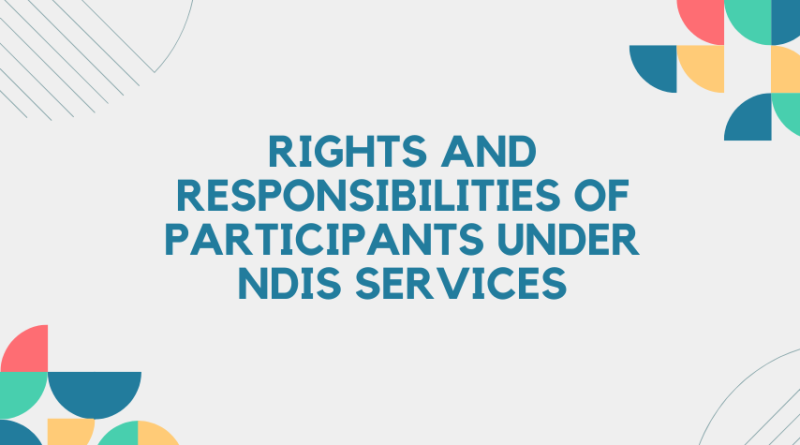Rights and Responsibilities of Participants Under NDIS Services
Ever wondered your rights and duties as a person receiving different disability services in Melbourne?
Understanding your rights and responsibilities as a person getting NDIS services in Melbourne or a client receiving home care disability services is crucial to ensuring you receive the best possible care and support. This blog provides a detailed look at the rights and responsibilities associated with both NDIS services and home care disability services.
Rights of NDIS Participants
-
Choice and Control:
NDIS participants have the right to choose and control the support and services they receive. This includes selecting service providers, determining how supports are delivered, and making decisions about their care plans.
-
Respect and Dignity:
Participants are entitled to be treated with respect and dignity. This means their personal preferences, cultural background, and privacy should be honoured. Providers must follow the NDIS Code of Conduct, which ensures respectful and ethical behaviour.
-
Safe and High-Quality Supports:
Participants have the right to safe and high-quality support. Providers must meet the NDIS Practice Standards, ensuring NDIS services in Melbourne are delivered effectively and safely. If the quality or safety of services is compromised, participants can file a complaint with the NDIS Quality and Safeguards Commission.
-
Access to Information:
Participants have the right to access information about their NDIS plan, available support, and how to manage their funding. This information should be accessible and easy to understand, with resources like the my place portal available for assistance.
-
Consumer Rights:
NDIS participants are protected under Australian Consumer Law. They have the right to receive goods and services of acceptable quality, fit for purpose, and as described. Issues with products or services can be addressed through remedies such as repairs, replacements, or refunds.
Responsibilities of NDIS Participants
- Managing Your Plan: Participants are responsible for actively managing their NDIS plans. This includes tracking goals, supports, and funding, regularly reviewing the plan to ensure it meets their needs, and making necessary adjustments
- Using Funding Appropriately: Participants must use NDIS funding appropriately, ensuring that supports and services purchased are directly related to their disability and align with their plan goals. Misuse of funds can result in penalties.
- Keeping Records: If participants self-manage their NDIS funds, they must keep accurate records of all transactions, including invoices, receipts, and bank statements. These records are essential for tracking spending and providing evidence of appropriate fund use.
- Communicating with Providers: Effective communication with service providers is crucial. Participants should clearly express preferences, provide feedback, and address any issues. If changes to service agreements are needed, they should discuss these with providers and follow appropriate procedures.
- Reporting Issues: Participants are responsible for promptly reporting problems with support or services. This includes raising complaints with providers, contacting the NDIS Quality and Safeguards Commission, or seeking help from local area coordinators (LACs) or support coordinators. Reporting issues helps maintain the quality and safety of NDIS services.
Rights and Responsibilities in Home Care Disability Services in Melbourne
Rights of Home Care Disability Services Clients
- Personalised Care: Clients have the right to personalised care that meets their specific needs and preferences. This includes individualised care plans developed in collaboration with healthcare professionals and the client.
- Respect and Dignity: Similar to NDIS participants, clients receiving home care services should be treated with respect and dignity. This involves honouring their cultural background, personal preferences, and privacy at all times.
- Safe and High-Quality Care: Clients have the right to receive safe and high-quality care. Home care providers must adhere to relevant health and safety standards to ensure that services are delivered effectively and safely.
- Access to Information: Clients should have access to information about the home care disability services in Melbourne, their rights and responsibilities, and how to manage their care. This information should be provided in an accessible and understandable format.
- Consumer Rights: Clients are protected under consumer law, ensuring that the goods and services they receive are of acceptable quality, fit for purpose, and as described. They have the right to remedies if these standards are not met.
Responsibilities of Home Care Disability Services Clients
- Engaging in Care Planning: Clients are responsible for actively participating in their care planning. This involves communicating their needs and preferences, providing feedback, and collaborating with healthcare professionals to develop and update care plans.
- Using Services Appropriately: Clients must use home care disability services in Melbourne appropriately, ensuring that the care and support they receive are used effectively and in line with their care plans. Misuse of services can impact the quality of care and available resources.
- Keeping Records: Clients should keep records of their care, including service agreements, care plans, and any communication with providers. These records help track the quality of care and provide evidence if issues arise.
- Communicating with Providers: Effective communication with home care providers is essential. Clients should express their needs and preferences clearly, provide feedback, and address any concerns. If changes to care plans are needed, they should discuss these with providers and follow appropriate procedures.
- Reporting Issues: Clients are responsible for reporting any problems with their care. This includes raising complaints with providers, contacting relevant regulatory bodies, or seeking assistance from support coordinators or advocates. Reporting issues helps maintain the quality and safety of home care service.
Final Words
Understanding your rights and responsibilities as an NDIS participant or home care disability services client is essential for ensuring you receive the best possible care and support. By actively managing your plan, using services and funding appropriately, and communicating effectively with providers, you can maximise the benefits of the support available to you.
Remember, a network of support is available to help you navigate the system and advocate for your needs. If you ever feel unsure or need assistance, reach out to your NDIS planner, support coordinator, or relevant regulatory bodies for guidance.
For more detailed information, visit the Ability All Care for personalised attention in NDIS disability services in Melbourne.




